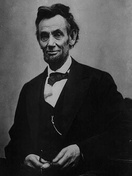 The American Civil War battle of Gettysburg occurred one hundred fifty years ago, July 1-3, 1863. Eleven weeks later, a solemn ceremony dedicated the cemetery at Gettysburg, Pennsylvania. Diplomat, professor, and pastor Edward Everett spoke to the crowd for two hours! President Abraham Lincoln was invited to add a few appropriate remarks. The next day, Everett wrote to Lincoln: “I should be glad, if I could flatter myself that I came as near to the central idea of the occasion, in two hours, as you did in two minutes.” But what did Lincoln say?
 Like many young American students I memorized this briefest of Presidential speeches. I delivered it into a microphone for the Parent Teacher Association. How it was received, I don't know. While other students made their presentations, I painfully crouched in a stuffy, draped box. "You're on," someone in the wings prompted. The audience would have seen slowly rising from the box, a black sock bearing a papier-mâché head with the familiar stove pipe hat and beard. "Fourscore and seven years ago, ...." I did not know then that there exist at least five variations of the Gettysburg Address. Press reports of the speech differ, and there are multiple versions from Lincoln's own hand! The Library of Congress and Wikipedia summarize these versions and where Lincoln got these ideas. Knowing that variations existed would have discouraged me. I certainly would have wanted to recite the "real" Gettysburg Address. But which one was it?  Later I visited the Gettysburg battlefield on a hot summer day and got a lasting impression of the devotion there. Even later, I got to know people who to various worthy causes gave the last full measure of devotion. I am glad now that I committed some of my brain to the ideas that Abraham Lincoln stated — whatever words he used—and to take increased devotion to that particular cause of government of, by, and for the people. When recently I learned of the variations in the Gettysburg Address, I was immediately reminded of the variations found in the records of what Jesus said. Every paragraph of the New Testament comes to us with variations. For example, starting at the red arrow, following is John 3:16 from Papyrus Bodmer, also called “P75”. Greek lettering style and other evidence suggests this copy was made around AD 200.  As you see, GreekwritingofthisancientvarietylackedspacesbetweenwordsandWASALLCAPITALLETTERS. It lacked most of our punctuation marks. Thus, without quote marks or other cues, some scholars think Jesus stopped talking to Nicodemus in verse 13. The remaining verses of John chapter 3 would be John’s words. Not intimidating enough for you? Jesus and those around him spoke mainly in the Aramaic dialects, a language family closely related to Hebrew. This Aramaic and Hebrew was subsequently translated to Greek such as shown above. Thus, though not without guilt, I cringe when preachers find microscopic distinctions in Greek, say in whether Jesus says the foundation of the church is Peter himself (a Roman Catholic view) or is Peter's words (a Protestant view). Words vary slightly among these old copies. For example, in John 3:16 the Bodmer copy (2nd & 3rd line) reads ton huion ton monogenay (the son the only-begotten). The Alexandrinus copy has ton huion auto ton monogenay (the son of him the only-begotten). The difference in translation is, "He gave the one and only son" versus "He gave his one and only son". For most Bible verses, the variations and ambiguities are likewise minor. Centuries of smart people have devoted their lives to organizing and reconciling these variations. They have left meticulous research notes that let dilettantes like me weigh the evidence for selecting variations other than the one they recommend. Just published is a new 28th edition of the Greek New Testament from which our modern translations derive. Some believers hold that God would not let his words be lost or altered. A few insist that a specific playlist of these words, called the "received text", miraculously preserves in Greek what Jesus said in Aramaic. Some non-believers shrug and observe that since obviously there exists variation among the texts forming the Bible we have, then God--if she exists--does not care about communication. Carl Sagan put it this way: “If God wanted to send us a message, and ancient writings were the only way he could think of doing it, he could have done a better job.”  I defaulted toward the miraculous preservation view until in my twenties I started to study these old copies and look at the "apparatus" footnotes that compactly list variants. Discovering a lack of perfection did not flip me to skepticism. Though frustrated that understanding God was not as convenient nor as precise as I hoped, I reasoned that a grainy picture could be better than no picture. I resolved to avoid deriving more detail than is reliably present, to not pin an important decision to just one ancient preposition. I came to be glad that we have multiple perspectives. Matthew, Mark, Luke, and John, are such. Then early commentators and later copies also help us see in 3-D as it were. With stereo. E pluribus unum. What about, "my word will not pass away"? Did God protect the Bible? I don’t see guaranteed protection of several things God values. For example, God does not defend each of us his children from suffering and violent death. Some yes, many no. Places and things once holy—the Ark of the Covenant and the Temples in Jerusalem—are absent or destroyed. God's one and only son rose from the dead, but first he was beaten, spat upon, and executed. So should I be surprised that the scripture originals were not preserved for my convenience? More important, though bruised and abused, the words of Jesus have not been lost. God created people in his own image. But that image now is marred. There exist both wheat seeds and weed seeds. Should I be shocked that in the publication we call the Bible there might be a quantity of non-inspired words mixed with God-breathed scripture? Life requires discernment. That's not news. Do these behind-the-scenes looks at the Gettysburg Address and the Bible discourage you? I’m sorry, that has not been my intent. I don't mean to "argue about words, which has no value". My aim is to provoke you to focus on the ideas the words carry. Far from calling it quits, I study more. God's principles are irreplaceable. "Turn the other cheek, go the second mile." I would not have come up with that idea on my own. In my amateur exploration, I have found this: What Jesus said and did, and what Jesus' people said and did pierces time itself to reach me. The Bible bears adequately reliable witness to what God does for me and what God wants from me. "God loved the world so much that he gave his one and only son, that whoever believes in him should not perish, but have everlasting life." Who would die for words? But for such ideas, people have indeed sacrificed. Overcoming our poor power to add or detract, this good news has endured.
0 Comments
Leave a Reply. |
Our Writers:At The Surge we love doing things together... that includes writing a blog! Here are a few of our main contributing authors: Greg JohnsonJesus++ Dwaine DarrahOur fearless leader, Dwaine is the lead pastor at The Surge. His experience in counter terrorism with the CIA prepared him for ministry and he likes dogs and babies even more than E does. EE (short for Eric Reiss) is the Wingman at The Surge and likes dogs, music, Mexican food, his wife Karen and his little girl Evangeline... not necessarily in that order. Archives
June 2024
Categories
All
|
|
|
The Surge Community Church
Meeting Sunday Mornings at The State Theatre in Falls Church, 11:10am! Rebroadcast Available Sunday Evenings with SurgeOnDemand, 7:00pm! |


 RSS Feed
RSS Feed
